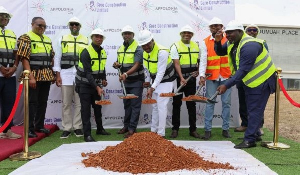Health News of Monday, 22 June 2015
Source: Press Release
Okyenhene marks environment week 2015
The Chairman of Okyeman Environment Foundation, Okyenhene, Osagyefuo Amoatia Ofori Panin has set out on a week-long tour of towns and villages in the Akyem Abuakwa Traditional area, as part of activities to mark the Okyeman Environment Week.
This year’s programme is on the theme “Our Prosperity should not Cost the Earth.”
The Okyenhene instituted the Okyeman Environment Week in 2000 as annual event for his Foundation, with the objective of creating awareness on the need to protect our environment to support our livelihood and for sustainable development in Akyem Abuakwa Kingdom.
The programme is usually organized to coincide with World Environment Day on 5th June.
This year however, the programme was postpones to start on 22nd June, 2015 and end on 27th June, 2015.
Okyeman Environment Week involves effective public awareness campaign in rural communities, which takes the form of community durbars hosted by the chief and elders of some selected communities in the Kingdom.
The selected communities include Tiawia, Akutuase, Aworensua, Kwakwaduam, Ehiawoanwu, Ntronan and Subriso, from Monday to Thursday. The climax of the tour will be at a big durbar at Kadewaso on Friday, and a Children’s Bazaar for primary schools in all the toured communities, also at Kadewaso.
Officers from relevant bodies like Environmental protection Agency (EPA) and Forest Services Division of the Forestry Commission have been invited to accompany the Okyenhene to lecture at the workshops on how the communities can cooperate with their respective bodies in achieving the overall objective of protecting our environment.
The session include public interactions to find out some of challenges the communities are facing in the areas environmental pollution, and degradation.
The tour also include a tree planting exercise in each of the communities to contribute to the on-going “Plant Our Future” initiative by the Okyeman Environment Foundation, which focuses on introducing an annual target of 100,000 indigenous tree species to help restore the degraded forest cover that was once the pride of the Kingdom.
Under this initiative, all communities in the Kingdom are urged to set aside a parcels of land for the purpose of developing woodlots. Schools are also encouraged to grow some of the seedlings on their school compounds to serve as shade and windbreak.
Since the initiative was launched, 52 communities have been engaged and have appreciated the improvements.












